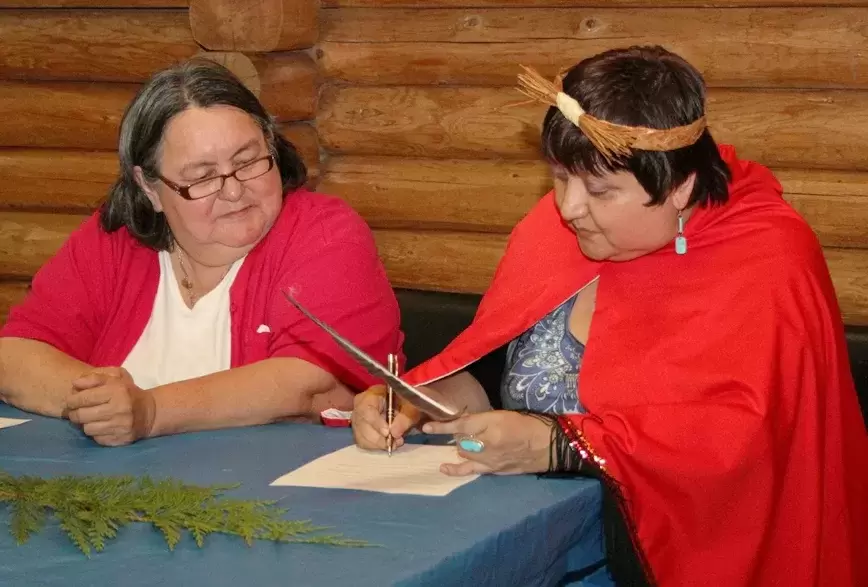After six years as an Assistant Deputy Minister in Victoria, Nuu-chah-nulth child services trailblazer Debra Foxcroft is coming home.
A member of Tseshaht First Nation, Foxcroft leaves behind a legacy of change in the way the province treats aboriginal children in need or at risk. As one of the founding members of USMA Nuu-chah-nulth Tribal Council Family and Child Services, and later chair of the Vancouver Island Aboriginal Transition Team, Foxcroft was recruited by the B.C. Ministry of Children and Family Services in 2006 to forge a new model of child welfare.
“My vision has always been that children and families and youth are best served from their own culture and their own identity at the community level, so that they have that connection to their children and families,” Foxcroft said. “I have seen a lot of changes in the 25 years I have worked in child welfare.”
Over the past six years, Foxcroft has been involved in educating ministry staff in First Nations culture, as well as using her experience and expertise to build relationships at the community level. She feels she has made a significant contribution to government, and looking back, Foxcroft recognizes there have been a lot of eyes on her performance.
“This was probably the first aboriginal/First Nations appointment at this level, so I have been seen as a role model for women and for the aboriginal community,” she said.
Foxcroft graduated from Alberni District Secondary School in 1973, and went right to work for Tseshaht First Nation on a job placement, as secretary/ receptionist.
“I worked with the late George Watts. He was the band manager,” she said, adding, “A great leader and a mentor.”
Over the next nine years, Foxcroft worked mainly at the old Cultural Centre, starting as a secretary/bookkeeper and, three years later, becoming a social development worker.
“I went to Camosun College and later to UVic for my training as band social development worker and social worker,” Foxcroft said.
In the early 1980s, she became social development coordinator for the 14 nations of the NTC, and stayed there for 17 years.
It was during that period that Foxcroft took part in the creation of USMA, and served as director of the new agency, which was the first delegated First Nations child and family services agency in B.C.
Along the way, she chaired the First Nations Summit Child Welfare Committee for nine years, as well as helped develop a set of culturally appropriate standards for service delivery agencies that is used nationwide.
Twelve years ago, Foxcroft left NTC to chair the Vancouver Island Aboriginal Transition Team.
“The government was doing their regionalization process and they were looking at separate authorities for aboriginal communities,” she said.
In 2003, during her time on the Transition Team, Foxcroft was honoured with the Order of British Columbia. Then, in 2006, after receiving recommendations from aboriginal leaders across the province, the deputy minister of the day invited her to come over to the government side for the first time.
Foxcroft said her work with the ministry put her in contact with the same familiar network of aboriginal communities, associations and agencies, many of whom were years behind Nuu-chah-nulth and USMA in their capacity to deliver services to families.
“We’ve had child protective services for 25 years, and [USMA is] now delivering services to urban areas, on and off reserve, everywhere from developing foster homes to providing protective services to the 14 Nuu-chah-nulth communities,” Foxcroft said. “We’ve gone from one [25 years ago] to about 23 agencies now, across the province.”
Those agencies range from small to large, and many are still working on developing the capacity to deliver services off reserve. Foxcroft said one agency created to deliver services to urban aboriginals in Vancouver is believed to be the largest of its kind in Canada.
Foxcroft, who is also an elected Tseshaht councillor, said she will wrap up her duties in Victoria on Sept. 25 and will be home in time for the NTC annual general meeting, which opens the next day at Maht Mahs Gym.
“I’m going to reconnect with my family and my community, and to be a grandma. I have three beautiful grandchildren, and it will be good to be home,” she said, adding, “And my home is on-reserve – that’s where my home and community is.
“What I have experienced over the years is that, where there is strong leadership – strong leaders that are connected to their culture and their language and their communities, and have a vision for what they want to see for their children and families, then you are going to see healthy children, youth and families.”
Foxcroft’s daughter, Kelly Poirier, was identified at an early age as part of the next generation of First Nations leaders, serving as NTC representative to Alberni-Clayoquot Regional District while in her twenties. Poirier said she needed to look no further than across the breakfast table to find a role model.
“I think of her as the modern contemporary career mom,” she said. “I’ve watched her be so incredibly focused on her career and on the idea that one person can make a difference. If I hadn’t seen it, I wouldn’t have believed it.”
But it has also meant a great deal of separation from family over the years, Poirier noted. Prior to taking up her ministry position in Victoria, Foxcroft spent much of the previous six years based in Nanaimo.
“To commit yourself to a vision, there is a great deal of sacrifice involved,” Poirier said, adding that even during Foxcroft’s years with USMA, it meant a lot of travelling to the communities.
“Some people are destined for bigger things. She is more than just my Mom,” Poirier said. “She has shown me what it takes when you believe in something.”







